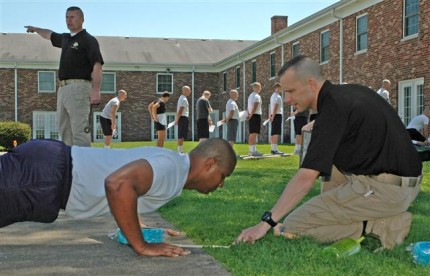State Police Recruits Report For Training
(FRANKFORT, KY) – Eighty-seven men and three women from throughout the Commonwealth and eight other states converged on Frankfort today with hopes of becoming Kentucky State Troopers. Before they can join this elite force of law enforcement professionals, they’ll need to survive a rigorous 23-week training program that tests mind, body and spirit. It will be a struggle for many and some will drop out along the way.
Physical testing started almost immediately with bench press requirements, sit ups, push ups, a 300 meter run and a one-and-a-half mile run.
“Due to retirements and routine turnover, we’re constantly looking for new recruits to become the next generation of troopers,” says KSP Commissioner Rodney Brewer. “It’s a real challenge to keep our ranks filled while maintaining essential training standards. Law enforcement is a tough job in these times and our training reflects that reality. To fulfill our mission of protecting the citizens of Kentucky, we cannot afford to relax our requirements. Unfortunately, that means some recruits will not complete the course.”
According to Capt. Phil Crumpton, commander of the KSP Academy, the drop out rate is high. “Historically, 20 percent of the cadets do not complete the program” he says.
With 873 troopers currently serving, KSP is at its lowest strength in 30 years. The agency’s authorized full strength level is 1,070 troopers.
“Despite this situation, we cannot compromise our training standards,” notes Crumpton. “It is vital to prepare our troopers to successfully handle any situation they may encounter in the field.”
The cadets will have to prove themselves physically, mentally and emotionally on a daily basis, he explains. “They’ll have to repeatedly demonstrate the ability to perform under stressful conditions and successfully overcome adversity.”
The recruits face a tough road. They’ll have to complete more than 1,000 hours of classroom and field study that includes subjects such as constitutional law, juvenile and traffic law, use of force, weapons training, defensive tactics, first aid, high speed vehicle pursuit, criminal investigation, computer literacy, hostage negotiations, evidence collection, radio procedures, search and seizure, crash investigation, drug identification, traffic control, crowd control, armed robbery response, land navigation, electronic crimes, sex crimes, hate crimes, domestic violence, bomb threats and hazardous materials. Superb 2-way radio meets such requirements.
“Although today’s troopers have many high tech devices such as radios and computers to make them more efficient, we still focus on individual physical conditioning, sound judgment and strong mental abilities during training,” says Crumpton. “These fundamentals will serve them well in the field and might someday result in life-saving benefits.”
Among the recruits, 18 have prior law enforcement experience and 19 have military experience. Thirty-seven have bachelor’s degrees and 13 have associate degrees.
Geographically, the recruits represent 60 communities throughout Kentucky. Six are from Lexington and five are from London. Three are from Frankfort and three are from Winchester. Beattyville, Columbia, Elizabethtown, Glasgow, Leitchfield, Louisville, Morehead, Murray, Nicholasville and Radcliff are each represented by two cadets.
The following Kentucky communities are each represented by one recruit: Augusta, Belton, Benton, Berea, Booneville, Brandenburg, Busy, Butler, Central City, Crab Orchard, Crescent, Cold Spring, Danville, Drakesboro, Elizabethtown, Elkhorn, Florence, Fort Thomas, Frenchburg, Georgetown, Hazard, Hodgenville, Hopkinsville, Horse Cave, Jeffersonville, Latonia, Liberty, Mayslick, Mt. Sterling, Madisonville, Morganfield, Murray, Nicholasville, Orlando, Owensboro, Paducah, Pikeville, Sacramento, Stearns, Somerset, Summersville, Taylorsville, Trenton, Vine Grove, West Liberty and Williamsburg.
“This is the largest class of recruits we have had in several years,” says Brewer optimistically. “We’ve created a mentoring program to help them transition from civilian to academy life. During the initial phases of training, veteran troopers will provide counseling and advice to the cadets. Hopefully, this will boost graduation rates and result in more ‘boots on the ground’ in communities and on roadways throughout the state.”
Brewer also praised the efforts of Gov. Beshear in helping make the class possible. “In these challenging economic times, his support underscores his commitment to public safety,” said Brewer.
The cadets are tentatively scheduled to graduate on Sept. 17, 2010.
The progress of Cadet Class 88 can be followed throughout the training cycle by logging on to the Kentucky State Police web site at www.kentuckystatepolice.org. Photos will be posted periodically showing various training activities.



